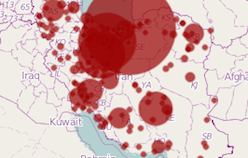Reported Executions in Iran
May 2025
39
In 2025
400
In 2024
942
In 2023
811
In 2022
579
In 2021
317
In 2020
248
Newsletter and Updates
On April 9, 2025, more than 30 years after the bombing of the Jewish Community Center, the Asociación Mutual Israelita Argentina (AMIA), in Buenos Aires, Argentina, the lead prosecutor in the case is calling for the arrest of the ultimate decision-maker of the Islamic Republic of Iran.
This spring, as in every year since 2011, the United Nations Human Rights Council is scheduled to vote on a resolution highlighting the serious and ongoing human rights violations in the Islamic Republic of Iran. In late March 2025, in an effort to influence the outcome, Iran’s UN Mission in Geneva widely circulated a document entitled “The Second Report of the Special Committee for Investigating the 2022 Riots” among member states. The report is intended to support the Iranian government’s ongoing campaign to persuade Council members to vote against the resolution seeking to renew the mandate of the UN Special Rapporteur on Iran and to extend and expand the mandate of the Independent International Fact-Finding Mission on the Islamic Republic of Iran (FFMI) for another year.
Transnational Repression Must Be Stopped
December 30, 2024
Since its establishment in 1979, the Islamic Republic of Iran has used violence and intimidation to silence critics and advance its political goals and no continent has been spared. The findings of Abdorrahman Boroumand Center’s (ABC) research on transnational repression are not reassuring; Iran’s leaders have targeted Iranian diaspora members and foreigners worldwide, often with impunity. Today ABC releases Witness C, a 2011 Swiss TV documentary, which investigates the 1990 assassination of a dissident in Geneva and interviews extensively a former Islamic Republic intelligence operative known as “Witness C.”
